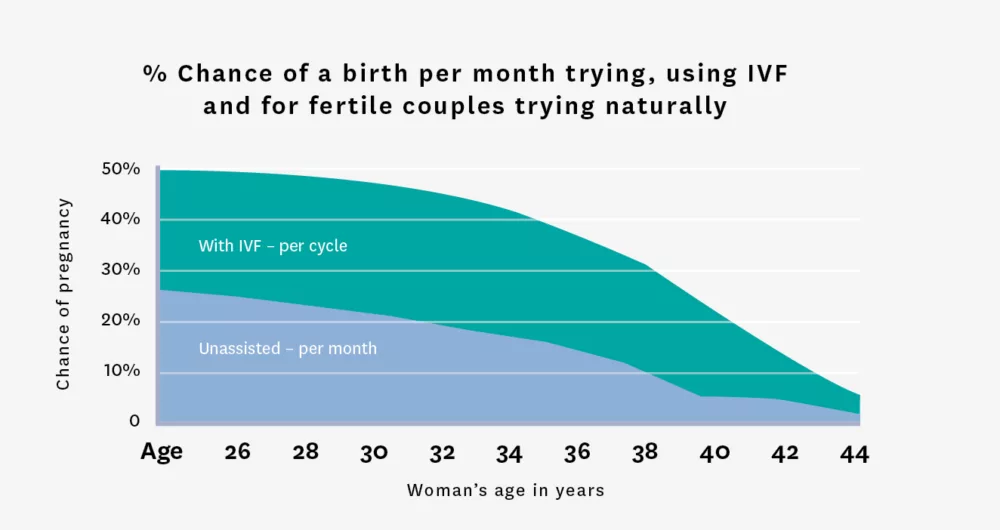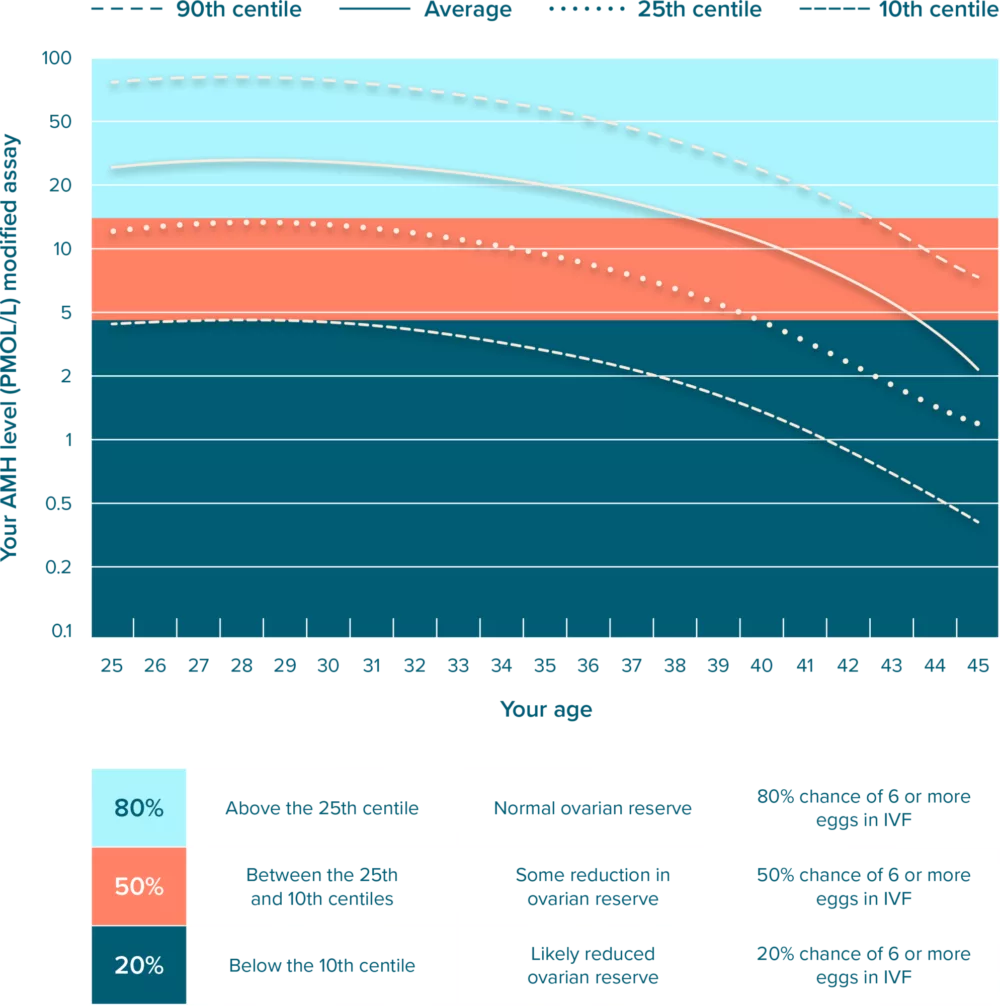For women
As everyone knows, you can’t escape the subject of age when it comes to understanding female fertility.
The chance of pregnancy falls as a woman gets older, and the risk of miscarriage and abnormalities increases, even for people with no fertility problems. If you are having trouble becoming pregnant, the sooner you seek help, the better your chance of having a baby.

Anti-Mullerian Hormone (AMH) testing
For some women, the effect of age kicks in early:
- About 10% of women experience menopause 5 years earlier than average – around the age of 45 instead of 50. Their fertility will fall 5 years earlier than average.
- About 1% of women go through menopause 10 years earlier than average, around the age of 35. Their fertility will fall 10 years earlier than average.
An AMH test is useful to understand if a woman will menopause earlier.
Ovarian Reserve is a term used to determine the number of eggs left in a woman’s ovaries.
The Anti-Mullerian Hormone (AMH) test is the best test currently available to estimate ovarian reserve, and may indicate the possibility of early fertility loss. However, it cannot show who is more fertile than average, nor does it predict ovarian reserve in women with Polycystic Ovaries (PCOS).
The Anti-Mullerian Hormone (AMH) test is the best test currently available to estimate ovarian reserve.
Your GP can request an AMH test, however we recommend an appointment with a fertility specialist to analyse the results, and to explain what they mean for you.
- It is a single blood test that can be done at any time during the menstrual cycle.
- It can help predict how many eggs you are likely to obtain in an IVF cycle.
- It may also identify women who may undergo early menopause, and therefore who may lose their fertility earlier than average.
- Your doctor or nurse will give you a separate blood form for the test and tell you where you can have your test done. The result is usually available a week or so after the blood has been taken. Your doctor will tell you the result in person, by telephone or by sending you a letter.
- The interpretation of the AMH result will depend on your medical history, your family’s fertility history, lifestyle and other investigations into your fertility.
- In some areas of New Zealand the AMH test is not publicly-funded. The cost is typically $85 to $110 depending on the lab.
Interpreting AMH
Like most fertility tests, an AMH test does not give a 'black and white' answer. We plot the AMH result on a graph, (see below), that shows the 10th, 50th and 90th centiles for AMH for women attending a fertility clinic. This lets you compare your results with women of a similar age and helps predict how your AMH level may change over the years. We have shaded areas of the graph green, orange and red to represent the average impact of your AMH level.
We’re here for you – whatever your age and stage of life
If you want to find out more about AMH testing, or to discuss your fertility options, we encourage you to book an appointment with us.
There are a variety of options available to women experiencing age-related fertility difficulties – we’ll guide and advise you as you search for what suits you best.

For men
While there’s no male equivalent to menopause, and the age of the mother is more important where fertility is concerned, the number of sperm made each day, and their quality, do fall with a man’s age.
Pregnancies from older men show higher incidences of some types of abnormalities among children – such as schizophrenia and autism. The total risk of a child having a serious birth defect, (from the biological father, the mother, or newly arising in the child), increases from an average of 20 per 1000 children for men aged 20; to 26 per 1000 children for men aged 50.
A man’s age does not seem to affect the chance of success in fertility treatments such as IVF – at least up to the age of 50.
When to seek help
Knowing when to seek help can be confusing
Should you keep trying for a bit longer, or do you need to book an appointment to talk it through? Talk to one of our experienced fertility nurses in a free, no obligation 15 minute telephone chat. Book now.
FAQs
What should I ask the doctor at my first appointment?
Here is a list of possible questions you may want to ask at your first appointment:
- What lifestyle changes can I make to boost my chance of success (eg, diet, exercise, stopping smoking, etc)? How will these help?
- Who will be the team caring for me? Who should I contact if I have a question?
How can I get an AMH test?
Your doctor or nurse will give you a separate blood form for the test and tell you where you can have your test done. The result is usually available a week or so after the blood has been taken. Your doctor will tell you the result in person, by telephone or by sending you a letter. The interpretation of the AMH result will depend on your medical history, your family’s fertility history, lifestyle, and other investigations to your fertility.
How much does an AMH test cost?
In most areas of New Zealand, the AMH test Is not publicly funded. Unless you live in one of those areas where the test is publicly funded and you meet the criteria, Fertility Associates will send you an invoice for it. This may arrive a few weeks after you have had your test because the blood collection labs only bill us once a month. The cost is typically $90 to $125* depending on the lab.
Fertility Associates does pay for an AMH test immediately before publicly funded treatment to help decide the best drug dose.
How do i interpret AMH results?
Like most fertility tests, an AMH test does not give a black and white answer. We plot the AMH result on a graph (see below) that shows the 10th, 25th, 50th and 75th centiles for AMH for women attending a fertility clinic. This lets you compare your results with women of a similar age and helps predict how your AMH level may change over the years. We have shaded areas of the graph green, orange and red to represent the average impact of your AMH level.
Download AMH leaflet PDF for more information.
What if I have no sperm?
In such instances, we would perform an examination and run some blood and genetic tests. Where possible, we could attempt to retrieve the sperm directly from the testicles. This sperm would then be used to fertilise any eggs collected from an IVF cycle.




